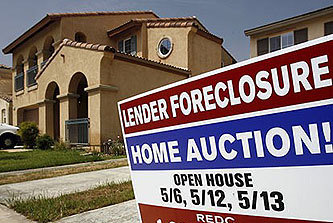A couple of days ago the Los Angeles city attorney’s office sued Deutsche Bank. Why? Because it’s a slumlord:
The Frankfurt, Germany-based bank has foreclosed on more than 2,000 homes over the last four years in neighborhoods across the city, according to the suit — many concentrated in the northeast San Fernando Valley, northeast Los Angeles and South Los Angeles.
Los Angeles officials say the bank has been a dreadful landlord and neighbor. Prosecutors say that during a yearlong investigation, they found evidence that Deutsche Bank had illegally evicted some tenants, let others live in squalor and allowed hundreds of unoccupied properties to turn into graffiti-scarred dens for squatters, gang members and other criminals.
Deutsche Bank, unsurprisingly, is passing the buck: they say the party responsible for keeping up foreclosed houses is the loan servicer, not the bank. But loan servicers, who make their money from the fees they collect during the foreclosure process, are notoriously unwilling to spend money once the foreclosure is finished, and they’re also notoriously hard to prosecute. So Los Angeles is trying a different tack: holding the ultimate owner of the property—Deutsche  Bank, in this case—responsible for the condition of their property. They’re the ones who hired the slumlord, after all.
Bank, in this case—responsible for the condition of their property. They’re the ones who hired the slumlord, after all.
All I can say is: good for them. The foreclosure mess of the past three years has been one of the biggest black marks on both the banking industry and the Obama administration, which has essentially punted the entire issue, hoping that if it kicked the can down the road long enough the problem would just fade away as the economy improved. HAMP, its primary program for loan modifications, has not only been a miserable failure on its own merits but has failed to change the incentives in the housing industry, which are almost Dickensian in the way they reward the most egregious possible behaviors. As Mike Konczal put it a few months ago, “Obama’s Treasury team took a system that had a terrible design and doubled-down on it.”
The problem is simple: the HAMP program provides only modest incentives for banks to perform the kinds of loan modifications that might genuinely help distressed homeowners. Opposed to that are the lucrative fees that loan servicers make by stringing homeowners along—fees for insurance, appraisals, title searches, legal services, etc.—and then eventually allowing them to default anyway. Loan modifications, even with the HAMP incentives added in, are still net money losers. There’s way more money to be made by offering homeowners a sliver of hope, collecting fees along the way, and then foreclosing after all. Peter Goodman lays out the gruesome details here.
There are plenty of ways we could change those incentives, but we haven’t done any of them. So Los Angeles is trying to change them on its own. If banks are required to maintain foreclosed properties properly, that suddenly makes foreclosure a less appealing prospect and the financial incentives start to tip in the direction of making a loan modification. Sure, you take a small hit, but you avoid the cost of not being ultimately responsible for maintenance and upkeep.
Maybe it’ll work. Given the bottomless legal resources of big banks, I wouldn’t bet the ranch on it. But it’s worth a try. Right now the foreclosure industry is practically designed to make as much money from people’s misery as possible, and more misery means more money. Anything that can turn those incentives around is a step in the right direction. Here’s hoping LA, as it’s so often been in the past, is a trendsetter for the rest of the country.

















